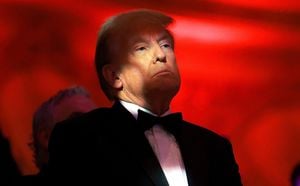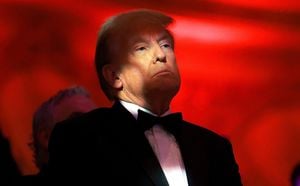President-elect Donald Trump has made it clear: tariffs are set to be a cornerstone of his economic strategy. Dubbed by Trump as the “most beautiful word” in the dictionary, he plans to implement various tariffs ranging from 10% to 20% on all foreign imports to eye-popping rates of up to 75% on goods from Mexico and 60% on Chinese imports. This proposed agenda raises questions about his approach to congressional oversight and the powers vested within the executive branch.
While the U.S. Constitution traditionally delegates the authority to set tariffs to Congress, history shows us instances where presidents have flexed their muscle to impose tariffs without waiting for legislative approval. Experts point out several statutes allowing Trump to enact tariffs immediately upon taking office. For example, the Trade Expansion Act of 1962, particularly Section 232, enables the president to impose tariffs for national security reasons. Similarly, Section 301 of the Trade Act of 1974 allows tariffs to remedy unfair trade practices.
During his first term, Trump did just this, utilizing both of these statutes extensively. His administration placed tariffs on Chinese imports and used Section 232 to shield the domestic steel and aluminum industries. These precedents suggest Trump has the legal pathways to impose new tariffs once again, sidestepping Congress if needed.
Yet, the powers of the presidency come with limitations. Although Trump can introduce temporary tariffs, only Congress can make permanent changes. Edward Alden, a senior fellow at the Council on Foreign Relations, reminded us of this. Interestingly, many of the tariffs established during Trump’s first administration are still intact, largely because President Joe Biden has chosen to maintain them, including those on Chinese goods. This begs the question: if Biden upheld these tariffs, how might Congress respond if Trump decides to scale them up significantly?
Critics of Trump's tariff plans argue they're not only economically perilous but may lead to inflationary pressures. Many economists warn broad-based tariffs likely raise prices for consumers and can contribute to economic shrinkage over time. A report from the Peterson Institute for International Economics asserts these tariff hikes can escalate costs for both individuals and businesses alike, potentially worsening unemployment rates and increasing economic inequality.
Despite warnings from experts, Trump has remained confident, proclaiming tariffs as beneficial for American manufacturing. But as history reflects, the economic impact of such strong tariffs is multi-faceted. From misunderstandings about trade balances to mounting consumer prices, the ramifications could ripple far beyond manufacturing benefits.
Within Trump’s circle, the appointment of certain individuals to key economic positions raises eyebrows, especially concerning his planned tariff implementation. Kevin Warsh, for example, is considered for the role of Treasury Secretary. Warsh’s past advocacy for free trade has some expressing concern, wondering whether his fiscal philosophy aligns with Trump’s populist message which focuses heavily on tariffs. Nick Iacovella, former aide to Sens. Marco Rubio, emphasizes the central role tariffs will play, stating, “Tariffs are going to be absolutely necessary for the economic vision of the second Trump administration.”
Warsh's background could signify not just Trump’s commitment to appointing traditional Republican voices but also highlight tensions within his own party over the direction of his economic policies. A former Trump administration official noted, “Bringing people like Kevin in would demonstrate the broad coalition of support Trump has assembled across the country.” Yet, the belief persists among his loyal supporters: the true economic philosophy should focus on protectionism and tariffs.
This inner turmoil hints at complex negotiations and potentially bitter disagreements surrounding Trump’s anticipated return to economic policy leadership. Would he favor the populist perspective tightly linked to aggressive tariffs or lean toward more traditional economic strategies favoring free trade? Just as significant is the role Congress will have as they reckon with the repercussions of his policies.
Still, Trump’s decisions will fundamentally shape his administration’s economic narrative moving forward. Choosing to implement high tariffs without solid congressional support could signal challenges down the line, as well as new avenues for pushback from those wary of his changes.
The political ramifications can’t be understated. While Trump’s populist stance on tariffs undoubtedly rallies his base, questions linger about how independent states and congressional leaders will react. Amid growing bipartisan discussions about pricing and trade deficits, Trump’s emphasis on tariffs could catalyze moves from both sides of the aisle. Although some may embrace stricter trade policies, others may call for greater diplomatic engagement and maintaining the status quo, reigniting tensions within the GOP.
Going forward, the question is: How will Congress monitor, review, or react to Trump’s tariff initiatives? With economic experts warning against the potential fallout of his proposals, it remains to be seen how effectively Congress can exercise its powers and influence over any trade-related policies.



